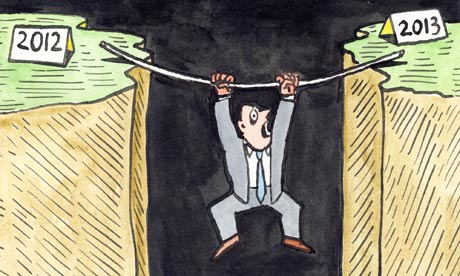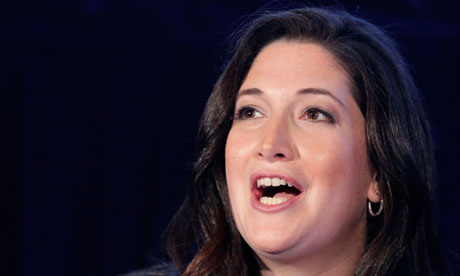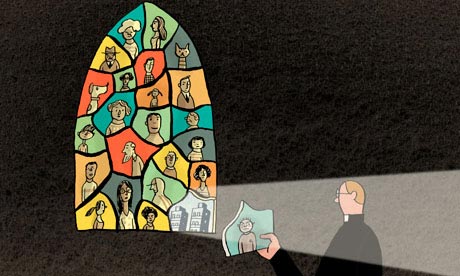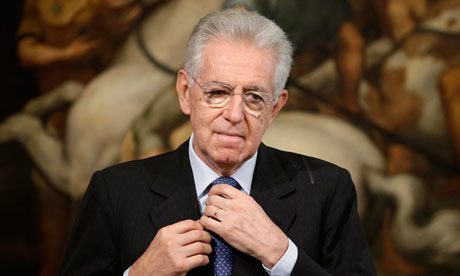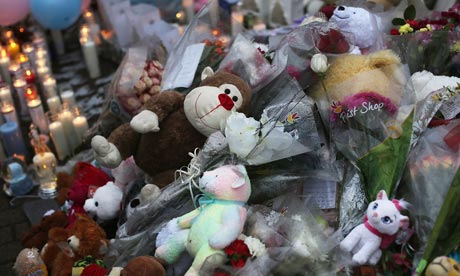Numerous commentators have rightly lamented the difference in how these childrens’ deaths are perceived. What explains it?
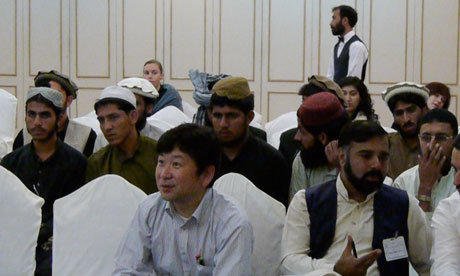
Tariq Aziz (centre, second row) attending a meeting about drones strikes in Waziristan, held in Islamabad, Pakistan on 28 October 2011. Three days later, the 16 year old was reported killed by a drone-launched missile. Photograph: Pratap Chatterjee/BIJ
Over the last several days, numerous commentators have lamented the vastly different reactions in the US to the heinous shooting of children in Newtown, Connecticut as compared to the continuous killing of (far more) children and innocent adults by the US government in Pakistan and Yemen, among other places. The blogger Atrios this week succinctly observed:
"I do wish more people who manage to fully comprehend the broad trauma a mass shooting can have on our country would consider the consequences of a decade of war."
My Guardian colleague George Monbiot has a powerful and eloquent column this week provocatively entitled: "In the US, mass child killings are tragedies. In Pakistan, mere bug splats". He points out all the ways that Obama has made lethal US attacks in these predominantly Muslim countries not only more frequent but also more indiscriminate - "signature strikes" and "double-tap" attacks on rescuers and funerals - and then argues:
"Most of the world's media, which has rightly commemorated the children of Newtown, either ignores Obama's murders or accepts the official version that all those killed are 'militants'. The children of north-west Pakistan, it seems, are not like our children. They have no names, no pictures, no memorials of candles and flowers and teddy bears. They belong to the other: to the non-human world of bugs and grass and tissue.
"'Are we,' Obama asked on Sunday, 'prepared to say that such violence visited on our children year after year after year is somehow the price of our freedom?' It's a valid question. He should apply it to the violence he is visiting on the children of Pakistan."
Political philosophy professor Falguni Sheth similarly writes that "the shooting in Newtown, CT is but part and parcel of a culture of shooting children, shooting civilians, shooting innocent adults, that has been waged by the US government since September 12, 2001." She adds:
"And let there be no mistake: many of 'us' have directly felt the impact of that culture: Which 'us'? Yemeni parents, Pakistani uncles and aunts, Afghan grandparents and cousins, Somali brothers and sisters, Filipino cousins have experienced the impact of the culture of killing children. Families of children who live in countries that are routinely droned by the US [government]. Families of children whose villages are raided nightly in Afghanistan and Iraq."
Meanwhile, University of Michigan professor Juan Cole, at the peak of mourning over Newtown, simply urged: "Let's also Remember the 178 children Killed by US Drones". He detailed the various ways that children and other innocents have had their lives extinguished by President Obama's policies, and then posted this powerful (and warning: graphic) one-and-a-half-minute video from a new documentary on drones by filmmaker Robert Greenwald (no relation):
Finally, the Yemeni blogger Noon Arabia posted a moving plea on Monday: "Our children's blood is not cheaper than American blood and the pain of loosing [sic] them is just as devastating. Our children matter too, Mr. President! These tragedies 'also' must end and to end them 'YOU' must change!"
There's just no denying that many of the same people understandably expressing such grief and horror over the children who were killed in Newtown steadfastly overlook, if not outright support, the equally violent killing of Yemeni and Pakistani children. Consider this irony: Monday was the three-year anniversary of President Obama's cruise missile and cluster-bomb attack on al-Majala in Southern Yemen that ended the lives of 14 women and 21 children: one more child than was killed by the Newtown gunman. In the US, that mass slaughter received not even a small fraction of the attention commanded by Newtown, and prompted almost no objections (in predominantly Muslim nations, by contrast, it received ample attention and anger).
It is well worth asking what accounts for this radically different reaction to the killing of children and other innocents. Relatedly, why is the US media so devoted to covering in depth every last detail of the children killed in the Newtown attack, but so indifferent to the children killed by its own government?
To ask this question is not - repeat: is not - to equate the Newtown attack with US government attacks. There are, one should grant, obvious and important differences.
To begin with, it is a natural and probably universal human inclination to care more about violence that seems to threaten us personally than violence that does not. Every American parent sends their children to schools of the type attacked in Newtown and empathy with the victims is thus automatic. Few American parents fear having their children attacked by US drones, cruise missiles and cluster bombs in remote regions in Pakistan and Yemen, and empathy with those victims is thus easier to avoid, more difficult to establish.
One should strive to see the world and prioritize injustices free of pure self-interest - caring about grave abuses that are unlikely to affect us personally is a hallmark of a civilized person - but we are all constructed to regard imminent dangers to ourselves and our loved ones with greater urgency than those that appear more remote. Ignoble though it is, that's just part of being human - though our capacity to liberate ourselves from pure self-interest means that it does not excuse this indifference.
Then there's the issue of perceived justification. Nobody can offer, let alone embrace, any rationale for the Newtown assault: it was random, indiscriminate, senseless and deliberate slaughter of innocents. Those who support Obama's continuous attacks, or flamboyantly display their tortured "ambivalence" as a means of avoiding criticizing him, can at least invoke a Cheneyite slogan along with a McVeigh-taught-military-term to pretend that there's some purpose to these killings: We Have To Kill The Terrorists, and these dead kids are just Collateral Damage. This rationale is deeply dishonest, ignorant, jingoistic, propagandistic, and sociopathic, but its existence means one cannot equate it to the Newtown killing.
But there are nonetheless two key issues highlighted by the intense grief for the Newtown victims compared to the utter indifference to the victims of Obama's militarism. The first is that it underscores how potent and effective the last decade's anti-Muslim dehumanization campaign has been.
Every war - particularly protracted ones like the "War on Terror" - demands sustained dehumanization campaigns against the targets of the violence. Few populations will tolerate continuous killings if they have to confront the humanity of those who are being killed. The humanity of the victims must be hidden and denied. That's the only way this constant extinguishing of life by their government can be justified or at least ignored. That was the key point made in the extraordinarily brave speech given by then-MSNBC reporter Ashleigh Banfield in 2003 after she returned from Iraq, before she was demoted and then fired: that US media coverage of US violence is designed to conceal the identity and fate of its victims.
The violence and rights abridgments of the Bush and Obama administrations have been applied almost exclusively to Muslims. It is, therefore, Muslims who have been systematically dehumanized. Americans virtually never hear about the Muslims killed by their government's violence. They're never profiled. The New York Times doesn't put powerful graphics showing their names and ages on its front page. Their funerals are never covered. President Obama never delivers teary sermons about how these Muslim children "had their entire lives ahead of them - birthdays, graduations, weddings, kids of their own." That's what dehumanization is: their humanity is disappeared so that we don't have to face it.
But this dehumanization is about more than simply hiding and thus denying the personhood of Muslim victims of US violence. It is worse than that: it is based on the implicit, and sometimes overtly stated, premise that Muslims generally, even those guilty of nothing, deserve what the US does to them, or are at least presumed to carry blame.
Just a few months ago, the New York Times reported that the Obama administration has re-defined the term "militant" to mean: "all military-age males in a strike zone" - the ultimate expression of the rancid dehumanizing view that Muslims are inherently guilty of being Terrorists unless proven otherwise. When Obama's campaign surrogate and former Press Secretary Robert Gibbs was asked about the US killing by drone strike of 16-year-old American citizen Abdulrahman Awlaki two weeks after his father was killed, Gibbs unleashed one of the most repulsive statements heard in some time: that Abdulrahman should have "had a more responsible father". Even when innocent Muslim teenagers are killed by US violence, it is their fault, and not the fault of the US and its leaders.
All of this has led to rhetoric and behaviour that is nothing short of deranged when it comes to discussing the Muslim children and other innocents killed by US violence. I literally have never witnessed mockery over dead children like that which is spewed from some of Obama's hard-core progressive supporters whenever I mention the child-victims of Obama's drone attacks. Jokes like that are automatic. In this case at least, the fish rots from the head: recall President Obama's jovial jokes at a glamorous media dinner about his use of drones to kill teenagers (sanctioned by the very same political faction that found Bush's jokes about his militarism - delivered at the same media banquet several years earlier - so offensive). Just as is true of Gibbs' deranged and callous rationale, jokes like that are possible only when you have denied the humanity of those who are killed. Would Newtown jokes be tolerated by anyone?
Dehumanization of Muslims is often overt, by necessity, in US military culture. The Guardian headline to Monbiot's column refers to the term which Rolling Stones' Michael Hastings reported is used for drone victims: "bug splat". And consider this passage from an amazing story this week in Der Spiegel (but not, notably, in US media) on a US drone pilot, Brandon Bryant, who had to quit because he could no longer cope with the huge amount of civilian deaths he was witnessing and helping to cause:
"Bryant and his co-workers sat in front of 14 computer monitors and four keyboards. When Bryant pressed a button in New Mexico, someone died on the other side of the world. . . .
"[H]e remembers one incident very clearly when a Predator drone was circling in a figure-eight pattern in the sky above Afghanistan, more than 10,000 kilometres (6,250 miles) away. There was a flat-roofed house made of mud, with a shed used to hold goats in the crosshairs, as Bryant recalls. When he received the order to fire, he pressed a button with his left hand and marked the roof with a laser. The pilot sitting next to him pressed the trigger on a joystick, causing the drone to launch a Hellfire missile. There were 16 seconds left until impact. . . .
"With seven seconds left to go, there was no one to be seen on the ground. Bryant could still have diverted the missile at that point. Then it was down to three seconds. Bryant felt as if he had to count each individual pixel on the monitor. Suddenly a child walked around the corner, he says.
"Second zero was the moment in which Bryant's digital world collided with the real one in a village between Baghlan and Mazar-e-Sharif.
"Bryant saw a flash on the screen: the explosion. Parts of the building collapsed. The child had disappeared. Bryant had a sick feeling in his stomach.
"'Did we just kill a kid?' he asked the man sitting next to him.
"'Yeah, I guess that was a kid,' the pilot replied.
"'Was that a kid?' they wrote into a chat window on the monitor.
"Then, someone they didn't know answered, someone sitting in a military command centre somewhere in the world who had observed their attack. 'No. That was a dog,' the person wrote.
"They reviewed the scene on video. A dog on two legs?"
Seeing Muslim children literally as dogs: few images more perfectly express the sustained dehumanization at the heart of US militarism and aggression over the last decade.
Citizens of a militaristic empire are inexorably trained to adopt the mentality of their armies: just listen to Good Progressive Obama defenders swagger around like they're decorated, cigar-chomping combat veterans spouting phrases like "war is hell" and "collateral damage" to justify all of this. That is the anti-Muslim dehumanization campaign rearing its toxic head.
There's one other issue highlighted by this disparate reaction: the question of agency and culpability. It's easy to express rage over the Newtown shooting because so few of us bear any responsibility for it and - although we can take steps to minimize the impact and make similar attacks less likely - there is ultimately little we can do to stop psychotic individuals from snapping. Fury is easy because it's easy to tell ourselves that the perpetrator - the shooter - has so little to do with us and our actions.
Exactly the opposite is true for the violence that continuously kills children and other innocent people in the Muslim world. Many of us empowered and cheer for the person responsible for that. US citizens pay for it, enable it, and now under Obama, most at the very least acquiesce to it if not support it. It's always much more difficult to acknowledge the deaths that we play a role in causing than it is to protest those to which we believe we have no connection. That, too, is a vital factor explaining these differing reactions.
Please spare me the objection that the Newtown shooting should not be used to make a point about the ongoing killing of Muslim children and other innocents by the US. Over the last week, long-time gun control advocates have seized on this school shooting in an attempt to generate support for their political agenda, and they're perfectly right to do so: when an event commands widespread political attention and engages human emotion, that is exactly when one should attempt to persuade one's fellow citizens to recognize injustices they typically ignore. That is no more true for gun control than it is the piles of corpses the Obama administration continues to pile up for no good reason - leaving in their wake, all over the Muslim world, one Newtown-like grieving ritual after the next.
As Monbiot observed: "there can scarcely be a person on earth with access to the media who is untouched by the grief of the people" in Newtown. The exact opposite is true for the children and their families continuously killed in the Muslim world by the US government: huge numbers of people, particularly in the countries responsible, remain completely untouched by the grief that is caused in those places. That is by design - to ensure that opposition is muted - and it is brutally effective.
Accolades
President Obama, the recipient of the 2009 Nobel Peace Prize, has just been bestowed by TIME Magazine with the equally prestigious and meaningful accolade of 2012 Person of the Year.

